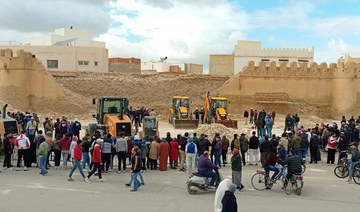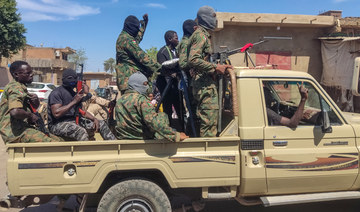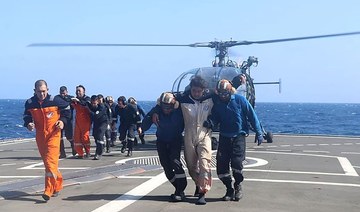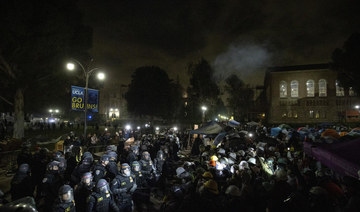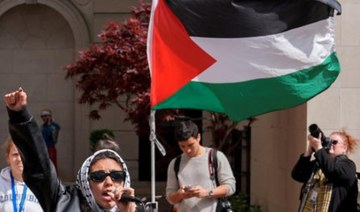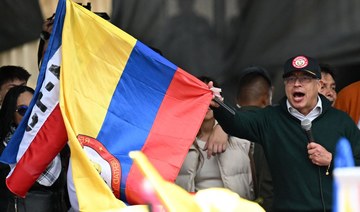TUNIS: Butter and milk shortages. Political party boycotts. Ongoing prosecutions of the president’s critics.
This is the environment in which Tunisians will head to the polls on Sunday for the country’s first local elections since President Kais Saied wrote a new constitution that voters approved last year.
Voting will determine the composition of a new National Council of Regions and Districts — one component of Saied’s vision to reshape politics in Tunisia, the country that sparked the region-wide uprisings that became known as the Arab Spring 12 years ago.
The new legislative chamber is designed to focus on economic development and candidates have campaigned on the radio about building schools, roads and other infrastructure. It harkens back to Saied’s campaign promise to distribute power and funds far from Tunisia’s capital. Tunis is synonymous with widely criticized government bureaucracy whose unpopularity helped fuel Saied’s rise.
But despite the transformation promised, few signs of enthusiasm about elections and their ability to buoy Tunisia are apparent. In the 13th election since the 2011 revolution, there’s little understanding about the stakes, what the new chamber has the power to do and whether voting even matters.
“People used to be motivated in other elections but nobody talks about this one or is up to date,” said Najib, a cafe owner in La Goulette who said in past contests candidates regularly put up signs throughout his establishment. He declined to give his name out of fear of losing customers.
Such is a familiar story for Tunisia, a country plagued by high unemployment, drought and shortages of basic necessities that credit ratings firms say is teetering on the verge of bankruptcy.
Amid a similar lack of enthusiasm, barely 11 percent of voters turned out for parliamentary elections last year even with growing concerns about the country’s political and economic woes.
Tunisia recently passed a new budget without major reforms that could bolster the economy or lure foreign lenders. It retains price controls and subsidies for flour, electricity and fuel. That’s even though reducing government spending on subsidies is one reform that the IMF has demanded in exchange for a $1.9 billion loan.
“The government is not living up to its responsibilities with regard to subsidies, which explains the scarcity of products,” said Aram Belhadj, a professor at the School of Economy and Management of Tunis.
Though the subsidies are written into the budget, Tunisia’s recent pattern of not compensating vendors has exacerbated shortages for goods like baguettes, he added. Despite political apathy, he noted that amid the shortages, people had begun paying closer attention to budgetary matters.
Without reforms, the ratings firm Fitch this month affirmed its assessment that Tunisia was at high risk for default with a CCC- rating, noting it did “not expect reforms will progress in 2024, in the context of the presidential election.”
The problems are apparent but there’s little recognition among the electorate that elections are taking place. They come more than two years after Saied suspended the country’s parliament and months after he dissolved municipal councils, further dismantling the systems put in place after the 2011 revolution.
That decision added to the outrage that Saied’s opponents have voiced since July 25, 2021, when he consolidated power, froze the parliament and sacked the prime minister. He has since imprisoned dozens of critics from business and political spheres, including Rached Ghannouchi, the leader of the political party Ennahda that ascended to power after last decade’s revolution.
Ennahda is among those who won’t participate in the elections. The party is part of the National Salvation Front coalition that is boycotting along with others including Tunisia’s Workers’ Party and the Free Destourian Party, whose leader Abir Moussi was imprisoned Oct. 3 for allegedly undermining state security.
“The political and social climate is not conducive to holding this local election, which does not meet international standards of democracy,” Ahmed Chebbi, the head of a leading coalition of opposition parties said at a news conference in November.
Apart from the boycotts, Fadil Alireza, a non-resident scholar at the Middle East Institute, said Tunisians had gradually become disillusioned about elections leading to better standards of living.
“People run. They make promises of what they’ll do and that Tunisia will be better. The fact that we’ve seen consistent decreasing purchasing power and deteriorating services — health, education, transportation ... makes disillusionment set in,” he said.
ISIE, Tunisia’s Independent High Authority for Elections, is sending out frequent text messages to remind voters about the election. Mohamed Tlili Mnasri, the authority’s spokesperson, said there had been few notable irregularities and that the authority was working to educate voters on the legislative chamber up for election.
He acknowledged expectations for low voter turnout and boycotts. But he said there were no thresholds for voting for the new chamber to be elected. And for democracies, what’s important is making the opportunity to vote available, he said.
“We’re still in the process of stabilizing institutions,” Mnasri said. “That’s what democratic transition is.”
Tunisians vote in local elections on Sunday to fill a new chamber as economy flatlines
https://arab.news/phdsr
Tunisians vote in local elections on Sunday to fill a new chamber as economy flatlines
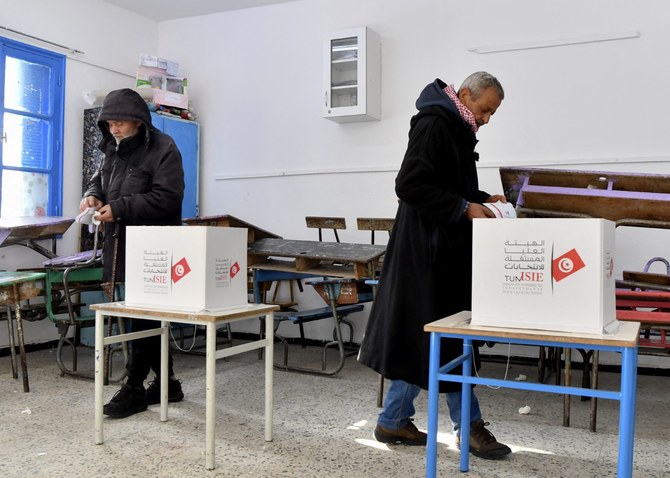
- The new legislative chamber is designed to focus on economic development and candidates have campaigned on the radio about building schools, roads and other infrastructure
Lebanon urged to conclude working arrangement with EU border agency Frontex to prevent illegal migration
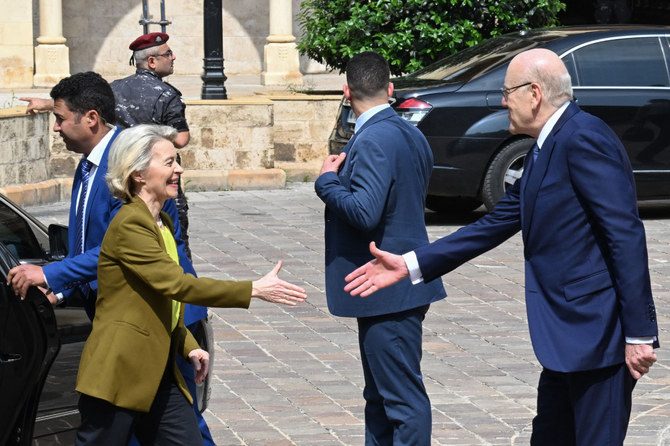
- Berri: Lebanon ready to discuss implementation of UN Resolution 1701 after Gaza aggression ends
- The EU assistance is tied to Lebanon’s need to implement the required reforms and control its borders and illegal crossings with Syria
BEIRUT: The EU has announced an aid package for Lebanon of1 billion euros ($1.06 billion) to help boost border control and halt the flow of asylum-seekers and migrants from the country across the Mediterranean Sea to Cyprus and Italy.
It comes against a backdrop of increasing hostility toward Syrian refugees in Lebanon and a major surge in irregular migration of Syrians from Lebanon to Cyprus.
The UN High Commissioner for Refugees, meanwhile, has decided to reduce healthcare coverage for registered Syrian refugees by 50 percent.
EU Commission President Ursula von der Leyen said during her visit to Beirut with Cypriot President Nikos Christodoulides that they hoped Lebanon would conclude a “working arrangement” with Frontex, the EU’s border agency.
Von der Leyen said the aid’s distribution will start this year and continue until 2027.
The aid will be dedicated to the most vulnerable people, including refugees, internally displaced people, and host communities.
The EU assistance — which is tied to Lebanon’s need to implement the required reforms and control its borders and illegal crossings with Syria — came in the wake of continued hostilities on the southern front between Hezbollah and the Israeli military.
The two officials arrived in Beirut following the European Council’s special meeting last month.
At the end of the meeting, the council confirmed the EU’s “determination to support the most vulnerable people in Lebanon, strengthen its support to the Lebanese Armed Forces, and combat human trafficking and smuggling.”
It also reaffirmed “the need to achieve conditions for safe, voluntary and dignified return of Syrian refugees, as defined by UNHCR.”
The visit lasted hours in Lebanon and included a meeting with caretaker Prime Minister Najib Mikati and Parliament Speaker Nabih Berri.
Following a tripartite meeting and an expanded discussion in which ministers and security officials participated, Mikati commended the EU’s understanding of the Lebanese state’s demand to reconsider some of its policies regarding assistance to Syrian refugees in the country.
Mikati said: “Lebanon has borne the greatest burden, but it can no longer endure the current situation, especially since the refugees constitute around one-third of Lebanon’s population, which results in additional difficulties and challenges and exacerbates Lebanon’s economic crisis.”
He added: “What is more dangerous is the escalating tension between Syrian refugees and the Lebanese host community due to the crimes that are increasing and threatening national security.”
Mikati emphasized that “Lebanon’s security is security for European countries and vice versa,” adding that “our cooperation on this matter constitutes the real entry point for stability.”
He added: “We refuse to let our country become an alternative homeland, and everyone knows that the solution is political excellence.”
Mikati called for the EU and international actors to recognize that most Syrian areas have become safe, which would facilitate the refugees’ repatriation and allow them to be supported in their home country.
As a first step, those who entered Lebanon in 2016 must go back, as most of them fled for economic reasons and are not considered refugees, said Mikati.
He warned against “turning Lebanon into a transit country to Europe,” saying that “the problems occurring on the Cypriot border are a sample of what might happen if the matter was not radically addressed.”
Von der Leyen, the first European Commission president to visit Lebanon, affirmed her “understanding of the Lebanese position.”
She said: “We want to contribute to Lebanon’s socio-economic stability by strengthening basic services and investments in, for example, education, social protection, and health for the people of Lebanon.
“We will accompany you as you take forward economic, financial, and banking reforms.
“These reforms are key to improving the country’s long-term economic situation. This would allow the business environment and the banking sector to regain the international community’s trust and thus enable private sector investment.”
The EU official said that the support program for the Lebanese military and other security forces “will mainly focus on providing equipment, training and the necessary infrastructure for border management.
“In addition, it would be very helpful for Lebanon to conclude a working arrangement with Frontex, particularly on information exchange and situational awareness.”
She continued: “To help you manage migration, we are committed to maintaining legal pathways open to Europe and resettling refugees from Lebanon to the EU.
“At the same time, we count on your cooperation to prevent illegal migration and combat migrant smuggling.”
Von der Leyen said: “We will also look at how we can make the EU’s assistance more effective. This includes exploring how to work on a more structured approach to voluntary returns to Syria, in close cooperation with UNHCR.”
She also stressed that the international community should strengthen support for humanitarian and early recovery programs in Syria.
Von der Leyen added: “We are deeply concerned about the volatile situation in southern Lebanon, and believe that the security of both Lebanon and Israel cannot be disassociated.
“So, we call for the full implementation of UN Security Council Resolution 1701.
“This needs to be part of a negotiated diplomatic settlement. The Lebanese armed forces are critical here, too, and the EU is ready to work on bolstering their capabilities.”
Christodoulides said that European assistance, which also includes “combating smuggling and managing borders and monitoring them,“ would “enhance the Lebanese authorities’ ability to confront various challenges such as monitoring land and sea borders, ensuring the safety of citizens, combating human trafficking, and continuing counterterrorism efforts.”
The Cypriot president said the “reverberations of the issues and challenges” that Lebanon was facing directly affected Cyprus and the EU.
“We need to work with our partners and UNHCR to discuss the issue of voluntary returns and reconsider the situation of some areas in Syria.”
He emphasized that Lebanon must implement the “necessary and deep reforms in line with the International Monetary Fund’s demands and address issues of accountability, and Cyprus will support Lebanon’s efforts to elect a new president, a development that will send a strong political and symbolic message for change and moving forward.”
Parliament Speaker Berri told the European official that Lebanon “does not want war, and since the moment the Israeli aggression began, it has remained committed to the rules of engagement, which Israel continues to violate, targeting the depth of Lebanon, not sparing civilians, media personnel, agricultural areas, and ambulances, using internationally banned weapons.”
Berri said that Lebanon, “while awaiting the success of international efforts to stop the aggression on the Gaza Strip, which will inevitably reflect on Lebanon and the region, will then be ready to continue the discussion on the implementation of UN Resolution 1701, to which Lebanon was and still is committed and adheres.”
Berri urged “the concerned parties to engage with the Syrian government, which now has a presence over most of its territories, in addressing the refugee issue.”
Red Cross says gunmen kill two of its drivers in Sudan
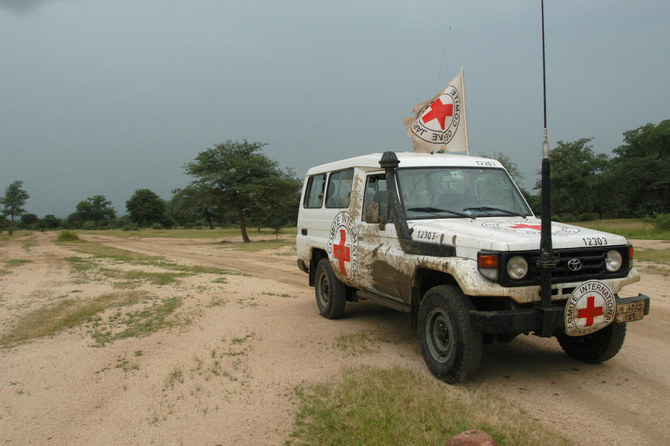
- The team was on its way back from Layba to assess the humanitarian situation of communities affected by armed violence
- “We are in deep mourning for our dear colleagues,” said Pierre Dorbes, head of the ICRC delegation in Sudan
GEENVA: Gunmen killed two drivers working for the International Committee of the Red Cross in war-torn Sudan on Thursday and injured three other staff, the ICRC said.
“The team was on its way back from Layba to assess the humanitarian situation of communities affected by armed violence in the region when the incident occurred” in South Darfur, the ICRC said in a statement.
“We are in deep mourning for our dear colleagues. We extend our sincere condolences to their families, and we hope for a speedy recovery for our injured co-workers,” said Pierre Dorbes, head of the ICRC delegation in Sudan.
A brutal conflict between the Sudanese army led by General Abdel Fattah Al-Burhan and the paramilitary Rapid Support Forces of his ex-deputy Mohamed Hamdan Dagalo has torn the country apart for more than a year.
The war has killed tens of thousands of people and forced millions more to flee their homes in what the United Nations has called the “largest displacement crisis in the world.”
It has also triggered acute food shortages and a humanitarian crisis that has left the northeast African country’s people at risk of starvation.
Houthi leader vows ‘fourth phase’ of Red Sea ship attacks
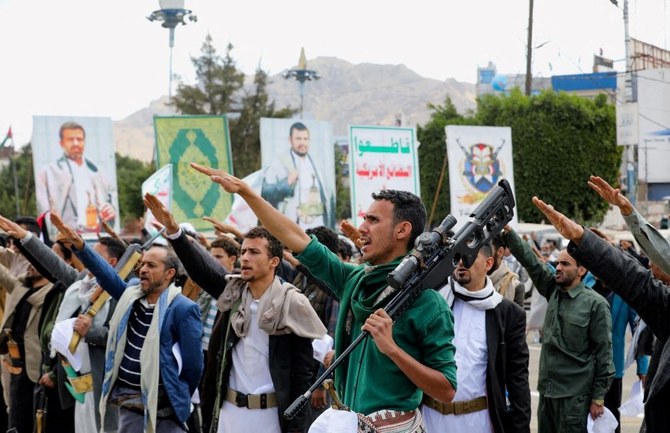
- Abdul Malik Al-Houthi: ‘We are preparing for a fourth round of escalation if the Israeli enemy and the Americans continue their intransigence’
- Al-Houthi said that 452 attacks by US and UK armies on militia-controlled regions had killed 40 people and injured 35 others since January
AL-MUKALLA: The leader of the Houthi militia vowed to escalate attacks on ships in the Red Sea until Israel ends its war in Gaza and the US stops attacking Yemen.
“We are preparing for a fourth round of escalation if the Israeli enemy and the Americans continue their intransigence,” Abdul Malik Al-Houthi said in a televised speech on Thursday.
Al-Houthi said that his forces launched 606 ballistic missiles and drones against 107 Israeli, US, and UK ships in the Red Sea, Bab Al-Mandab Strait, Gulf of Aden, and recently in the Indian Ocean during the Red Sea ship campaign that began in November.
In the last seven days alone, the Houthis have fired 33 ballistic missiles and drones at six ships in international seas off Yemen’s coast, as well as Israel’s city of Eilat.
Al-Houthi said that 452 attacks by US and UK armies on militia-controlled regions had killed 40 people and injured 35 others since January.
His warning came after the militia’s media said on Thursday that the US and UK carried out five airstrikes on Hodeidah airport in the Red Sea’s western city of Hodeidah.
On Tuesday, the US carried out another strike on the port of Al-Saleef in Hodeidah after the US Central Command reported its troops stopped a Houthi assault with a drone boat on the same day.
The Houthis have seized a commercial ship, sunk another, and launched hundreds of missiles and drones at international navy and commercial ships in the Red Sea since November, claiming to be in support of Palestinians and pressuring Israel to cease its war in Gaza.
As a response to the attacks, the US formed a coalition of marine forces to protect the Red Sea.
It also launched strikes on Houthi targets in Sanaa, Saada, Hodeidah, and other Yemeni areas controlled by the Houthis.
Turkiye’s Erdogan criticizes US crackdown on college protests
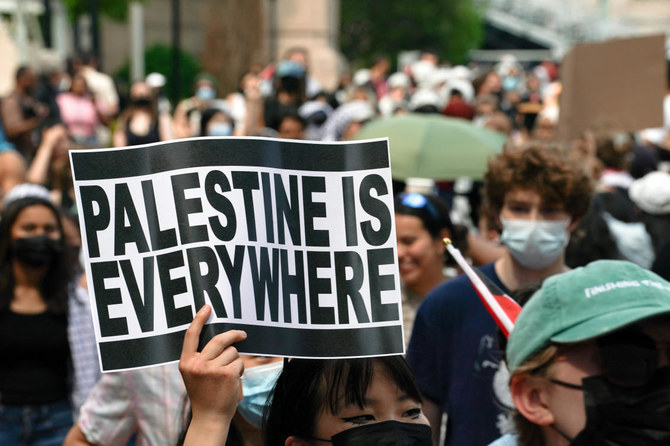
- “Conscientious students and academics including anti-Zionist Jews at some prestigious American universities are protesting the massacre (in Gaza),” Erdogan told an event
- “These people are being subjected to violence, cruelty, suffering, and even torture for saying the massacre has to stop“
ANKARA: Turkish President Tayyip Erdogan waded into the debate over US college campus protests on Thursday, saying authorities were displaying “cruelty” in clamping down on pro-Palestinian students and academics.
Demonstrations have spread on campuses across the United States over Israel’s conduct of the war in Gaza, prompting police crackdowns and arrests at some venues such as Columbia University in New York.
“Conscientious students and academics including anti-Zionist Jews at some prestigious American universities are protesting the massacre (in Gaza),” Erdogan told an event in Ankara.
“These people are being subjected to violence, cruelty, suffering, and even torture for saying the massacre has to stop,” he said, adding that university staff were being “sacked and lynched” for supporting the Palestinians.
Turkiye, a NATO ally of the United States, has sharply criticized Israel’s assault on Gaza and what it calls the unconditional support it receives from Western countries.
The US is a top supplier of military aid to Israel and has shielded the country from critical United Nations votes.
“The limits of Western democracy are drawn by Israel’s interests,” Erdogan said. “Whatever infringes on Israel’s interests is anti-democratic, antisemitic for them.”
More than 34,000 people have been killed in Gaza during Israel’s nearly seven-month military offensive, Palestinian health officials say, after Hamas militants killed some 1,200 people and took 253 hostages during an Oct. 7 assault on southern Israel, according to Israeli tallies.
Israel president says US universities ‘contaminated by hatred, anti-Semitism’

- “We see prominent academic institutions, halls of history, culture, and education contaminated by hatred and anti-Semitism fueled by arrogance and ignorance,” he said
- “We watch in horror as the atrocities of October 7th against Israel are celebrated and justified“
JERUSALEM: Israel’s president on Thursday slammed US universities for campus unrest over Israel’s war in Gaza, saying these institutions were “contaminated by hatred and anti-Semitism.”
Isaac Herzog said in a special broadcast that he was issuing an urgent message of support to Jewish communities amid a “dramatic resurgence in anti-Semitism and following the hostilities and intimidation against Jewish students on campuses across the US in particular.”
“We see prominent academic institutions, halls of history, culture, and education contaminated by hatred and anti-Semitism fueled by arrogance and ignorance,” he said.
“We watch in horror as the atrocities of October 7th against Israel are celebrated and justified.”
His comments came as hundreds of police and protesters were in a tense stand-off at the University of California, Los Angeles and unrest over Israel’s war against Hamas in Gaza continued to spread in campuses across the United States.
Demonstrators have gathered in at least 30 US universities since last month, often erecting tent encampments to protest the soaring death toll in the Gaza Strip.
Israel’s offensive in Gaza has killed at least 34,596 people in Gaza, mostly women and children, according to the Hamas-run territory’s health ministry.
It comes in response to Hamas’s unprecedented attack on Israel on October 7, which resulted in the deaths of 1,170 people, mostly civilians, according to an AFP tally of Israeli official figures.
The militants also took about 250 hostages, 129 of whom remain in Gaza, including 34 presumed dead, Israel says.
The protests against the war have posed a challenge to US university administrators trying to balance free speech rights with allegations of criminal activity, anti-Semitism and hate speech.
In his statement Thursday, Herzog said his message was addressed “to our friends on campuses and in Jewish communities across the United States and all over the world.”
“The people of Israel are with you. We hear you. We see the shameless hostility and threats. We feel the insult, the breach of faith and breach of friendship. We share the apprehension and concern,” he said.
“In the face of violence, harassment and intimidation, as masked cowards smash windows and barricade doors, as they assault the truth and manipulate history, together we stand strong,” he said.
“As they chant for intifada and genocide, we will work — together — to free our hostages held by Hamas, and fight for civil liberties and our right to believe and belong, for the right to live proudly, peacefully and securely, as Jews, as Israelis — anywhere.”
Pointing to Holocaust Memorial Day commemorations next week, the Israeli president said “we will speak of the dark times of the past, and we will remember the miracle of our rebirth.”
“Together, we shall overcome,” he said. “In the face of this terrifying resurgence of anti-Semitism: Do not fear. Stand proud. Stand strong for your freedom.”



